#for lesbians + other trans and nonbinary people who like a butch
Explore tagged Tumblr posts
Text
raff raff!!
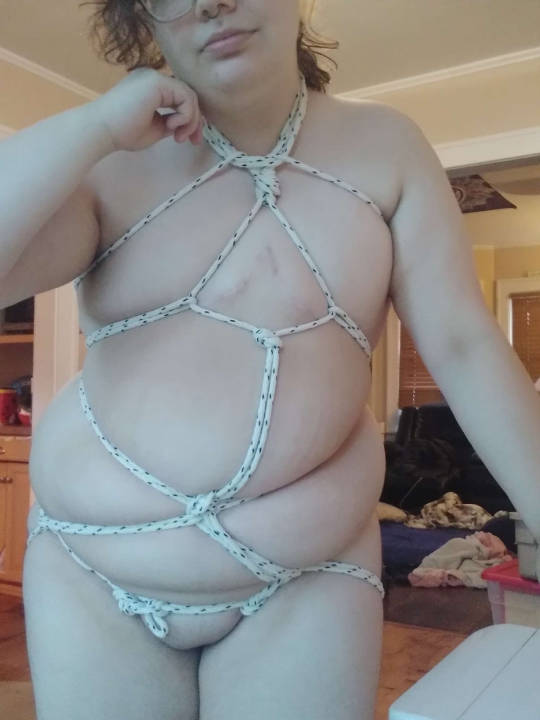
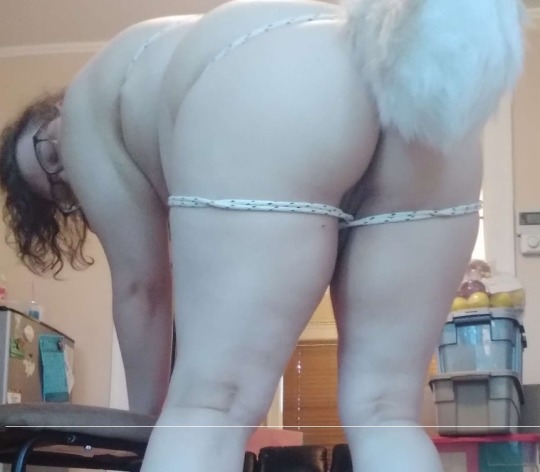

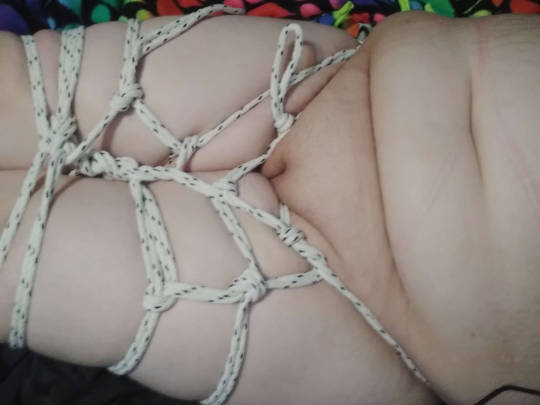
it/its cis men dni
#nsft#petplay.#t4t#puppy play.#shibari#sapphic nsft#for lesbians + other trans and nonbinary people who like a butch
17 notes
·
View notes
Text
i miss posting and making and engaging with ieytd content but I will be honest sometimes it feels alienating. as a lesbian.
#bee's buzzing#ieytd#i dont know.. its probably just me being Strange. but.#the Main guy in the fandom is juniper. and he's interesting! but. i don't... think about him as often#and when i do it's never in the shipping / x reader context i see so frequently in the tags.#i dont ship him with agent phoenix because. my agent is an it/its dyke. so i dont really engage in that side of fandom#i also dont think about the handler as often because. idk i just think about the women more!#but juniper and agent phoenix and the handler are like. the only people i see talked about often#which is fine!! people like them. i also like them just. not in the same way/to the same extent.#im here for the women. but. they're not talked about often at all :[#when they are it's usually briefly in passing.#they get the worst of the mischaracterization too imo. because people just do not give them the same depth as they like to give-#- charas like john. it makes me kinda sad tbh.#and also the fandom does not. seem to make much space for f/f content.#i know like. the handful of other people who make f/f content for ieytd.#and. god. idk im still honestly a bit ticked off by one solaris post that 1) was not a good analysis i will be quite honest.#it was very surface level. like really basic info and also iirc not entirely accurate? i cannot remember anymore#but. 2). it started by saying 'nobody talks about solaris outside of fabbylaris' and that still makes my blood boil.#like. not to vaguepost but. the fabbylaris posters ARE talking about solaris outside of a shipping context. please. please#also there was a whole Thing a while back where people started being strange about non-feminine nonbinary agent phoenix.#and as a nonbinary butch-adjacent dyke. it made my skin crawl!!! im NOT feminine and idk why making agent phoenix not feminine is.#apparently Bad to a certain subset of the fandom#sorry but im a dyke and i WILL make the player insert protag a butch lesbian who doesnt use she/her.#and if you have a problem with that please think about Why people making the player insert nonbinary and androgynous/Vaguely Masc is-#- such a problem to you. and whether that is alienating to the trans people in the fandom.#okay. im normal now. goodnight.
11 notes
·
View notes
Text
All of these "who has more anything gender!" polls are just. white man without extreme body builder muscles v white man without extreme body builder muscles. The gender is "masculine" stop pretending it's universal
#even worse is when it's 'tradionally feminine' v 'traditionally masculine (without super ripped muscles' and the notes are all#she's the opposite of gender he's THE only gender ever.#'gender' isn't even androgynous anymore it's just some guy#vent post#idk I'm just kind of 😬 about people not seeing binary girl or even predominantly feminine as 'gender' whatever the fuck that means#you like androgyny when it's on twinks but don't think the butch lesbian that only calls herself a woman is 'gender' huh#and something about genderfluid characters only ever being accepted when they're in their 'not cis' presentation (cough ze l da)#like..i consider myself genderfluid and sometimes have guy-adjacent euphoria days#(still think about everyone who he/hims me when I cosplay Link ❤️)#but... I get just as much when I'm wearing what's 'expected' of me like skirts and dresses and makeup and am seen as a girl#because a lot of times growing up i wasn't really included in the girl stuff but was still too girl for the boy things :/#and I feel like. everything focuses on the andro of androgynous that they forget androgynous doesn't mean vaguely fem guy#it's like. shiek is winning the gender poll. but zelda wouldn't. even though they're the same person and one doesn't exist without the other#nonbinary but the binary isn't girl-boy it's trans-cis#nice dichotomy idiot#what lies outside of it
13 notes
·
View notes
Text
like it used to be everyone liked + used the terms transfem + transmasc because they were used to broadly discuss the issues that trans people who transitioned/were transitioning physically socially or both shared regardless of things like their actual gender + presentation + stuff like they are very useful terms bc it covered a lot of different experiences that otherwise would leave people excluded in these discussions so i dont understand the push to change them so they mean... literally nothing essentially. "transmasc means ur trans + present masculine anyone can be transmasc" so its just masc...
#et cetera#similar gripe with the way people treat the TME/TMA thing but thats a diferent issue#like it was good bc it could cover for example...#AMAB nonbinary people on E trans women who have only transitioned socially transwomen who have undergone#SRS and other gender affirming surgeries but prefer to have a more masc gender presentation someone whos only#transition so far or at all is to present more feminine w no intention of hrt or surgery or social transition etc.#+ transmasc being used the same way#and even sometimes used to talk about butch cis women or nonbinary lesbians who r physically transitioning etc.#though i saw more discussions of transmasc being used in that more liberal way than transfem bc that is closer to my#personal experience etc. etc. etc. like u get what i meannnnnnn
16 notes
·
View notes
Note
Can I (as a Transmasculine FTM person who has been on T for over 2+ years) use the term “He/him Lesbian” in a sense that means I’m only attracted to other FTM / Transmasc / AFAB Non-binary individuals? I feel the term fits in a way and I’d like to reclaim it (it’s been used against me in the past!) and I was wondering if that’s okay to use it as a T4T sorta label?
I mean, I don't think it's, like, a moral dilemma for you to use that, and frankly, I don't think it's anybody's business to know why you'd use the label. There can be power in reclaiming different aspects of your experiences, and I totally get the appeal. I've done that plenty, personally! But, anyway, prioritizing good-faith queer identity is honestly more of my concern than judging people, and you aren't an exception.
#ask#anon#trans#transgender#lgbt#lgbtq#ftm#nonbinary#i'm sure you'll find other trans men and transmasc* people who'd feel the exact same way#like shit... literature like stone butch blues is a cornerstone of queer theory for a reason!#definitely give that a read for transmasc lesbianism (tw for sa and police violence and homophobia though)#that book gets dark but it is so worth a read for anybody who is able to read it
36 notes
·
View notes
Text
if you genuinely believe that trans men and cis men are enemies and need to be pitted against each other: you drank the terf juice.
if you believe that pre transition or never transition transfems "look too threatening" or "too cishet" or "unsafe for other queers to be around": you drank the terf juice.
if you misgender butch trans women and multigender transfem lesbians and remove them from lesbian spaces: you drank the terf juice.
if you police transfems and call them "loud," "aggressive," "mean," or "rude," just because they have deep voices or high testosterone bodies: you drank the terf juice.
if you genuinely believe that all men and mascs need to be barred from entry into non binary, lesbian, and other queer spaces: you drank the terf juice.
if you genuinely believe all cishet men are inherently queerphobic, evil, and dangerous to be around: you drank the terf juice.
if you genuinely believe trans and cis men are inherently violent and dangerous because they're men: you drank the terf juice.
if you genuinely believe that cis-passing trans men aren't queer and/or don't belong in queer spaces because they look and sound "too cis" or 'threatening': you drank the terf juice.
if you genuinely believe that anyone who is AMAB and/or has a penis is inherently violent: you drank the terf juice.
if you genuinely believe it's okay to profile strangers to assume they're cis or het (or ANYTHING): you drank the terf juice.
literally ALL of these things are terf ideologies and actions. in order to accept ourselves and be accepted, we must accept that just like how our identities are not inherently violent- neither are cis and het folks'.
blaming cis mens' gender instead of their actions and behaviors for their dangerous and queerphobic actions removes the responsibility from the individual man. that was one man who did something wrong.
hold that individual person accountable for their actions and leave their gender and/or birth sex out of it- they're irrelevant to the situation.
making trans women, intersex trans women, transfems, nonbinary people, genderqueer people, etc. uncomfortable by policing how they look and sound is not the way to go. policing transfems and preventing them from queer spaces is not the way to go. policing trans men and mascs and preventing them from entering spaces they belong in is not the way to go.
excluding queer men and mascs from the communities they rightfully belong in isn't helping anyone. cis gay men need community. cis asexual men need community. cis aromantic men need community. cis polyamorous men need community. genderqueer, non binary, and gnc cis men need community. cis bisexual/mspec men need community. trans women who are also men need community. trans men need community. intersex men need community. the list goes on.
community means working together, not fragmenting ourselves off into the tiniest micro pockets imaginable for the sake of "Safety". running afraid from every. single. man and masc you encounter will not keep you safe- femmes and women are capable of abuse. we cannot fall into this "woman good man bad" trap. being afraid of a group of people wholesale doesn't help you heal from whatever trauma you have. it's going to keep you scared for the rest of your life. it's best to move on and stop judging strangers for features they can't help or didn't ask for.
#lgbtqia#lgbtq#lgbt#queer#gay#lesbian#bisexual#intersex#non binary#nonbinary#genderqueer#genderfluid#bigender#multigender#trans man#trans men#transmasc#transmasculine#transfem#transfeminine#trans girl#trans woman#trans women#our writing
3K notes
·
View notes
Text
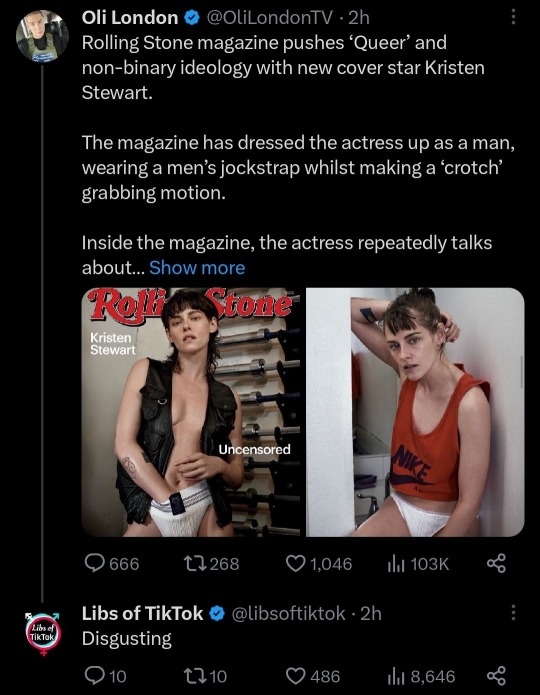
Hey, butch lesbian TERFs and gendercrits?
The other people who are part of your ideology do not give a shit about you. In fact, they hate you too.
As far as I am aware, Kristen Stewart does not identify as nonbinary at all. She just wanted to do a butch photoshoot, because she tends to be more masc, which has been the case with her for a while.
If you see a butch woman and claim it’s “pushing an ideology” and that she is “being dressed up like a man” and it’s “disgusting”, you hate gnc people as much as you hate trans people
Anyway, you are the ones pushing transness on to gnc people simply for the clothes they are wearing. Not us.
2K notes
·
View notes
Text

I got this comment on a post that I made about being a trans man and noticing how we’re perceived by others. This person is blocked now because I don’t want some transphobe on my blog, but I want to talk a little bit about this.
I like how this person’s trying to convince me that I’m wrong while saying that the only people who would be attracted to us are lesbians who are into butch women. But they can’t use those exact words or else we’ll all KNOW that they’re misgendering us. It’s interesting. Let’s play a game! TERF or transandrophobe. (I’m not scrolling through their blog long enough to find out.)
Okay. Let’s pretend that we live in their world, where trans men are not also a porn category (as someone pointed out in a response comment), and get to the deep cuts!
Now maybe this person defines oversexualization in a different way, and frequently commenting on our bodies—especially our chests—is totally cool and normal to them, because I literally have a post talking about the Tik Tok trend of “oh trans man wants me to respect his pronouns but he has HUGE BOOBS!!! haha this is so funny, guys!” You may notice that in this example here, she claims to feel bad, but then immediately turns around and makes a joke about it. Is describing transmascs essentially as our chests not sexualization? Not to mention dehumanizing considering they refer to this person as “a he/they,” instead of a transmasc or a nonbinary person or anything else.



But if that’s not enough sexualization for you, or you think that it isn’t valid to be upset over that, you can look under the cuts for the disgusting descriptions of our bodies from some transphobes. From some of those “ladies who just like butch,” since they’re innocent and aren’t oversexualizing us because “nobody oversexualizes ftm trans folks,” as the person in the screenshot said confidently.
I wanna say trigger warning for disgusting oversexualization of trans men (including trans men who are in their teens!) under the cut, but huh… the commenter said that nobody oversexualizes trans men, so this can’t be right. (On a serious note, please do heed the trigger warning before deciding to open the rest of the post.)





#not even mentioning how gay trans men are treated (as only transitioning to be a yaoi boy!!!) or any similar stuff#but I might add on something about that later#inb4 someone is like ‘waaah how can you respond to someone’s comment and also block them???’ idc about transphobes that’s how <3#transphobia#trans#anti transmasculinity#transmisandry#tw transandrophobia#transandrophobia#transgender#trans men#trans man#oppression
287 notes
·
View notes
Text
genuinely i don't think those people who say binary trans lesboys are just straight trans men have ANY idea how different the lesboy experience is from being straight. before i realized i wasn't cis, i was a cis girl that liked other girls - a lesbian. when i first came out, i identified as a binary trans boy, but the nature of my attraction never changed; there was always something about it that was just. inexorably queer in that it was tied to the gender i was assigned at birth, and how i'd identified beforehand. and i had no idea how to deal with that! i kept trying to shove myself into boxes that made sense - i'm gynesexual, i'm nonbinary, i'm a nonbinary lesbian, i'm a transmasc lesbian who isn't really a man. none of them felt like they fit me. i remember back then i was a truscum exclusionist too - if you're really trans you have to be this way, you can't be a boy and a lesbian, that's impossible. and even after i got out of that bigoted rut, i still felt the effects of it on me. i thought, why can't i just decide on a label that fits me? i can't be a binary trans man and a lesbian, i've been told that's horrible and doesn't make sense. what choice do i have here?
now that ive started letting myself be who i am, a trans guy who is bi and a lesboy, i genuinely feel so liberated. not because id felt left out beforehand, but because this is what ive always been. im finally letting myself be myself. i'm a boy. i'm a butch. i'm a dyke. deal with it.
396 notes
·
View notes
Text
Is everyone willingly ignoring it or when are we going to realize this petty label discourse has always been rooted in misogyny. This started long before Bi Lesbians. Some of you are just too new or simply never paid enough attention to realize the history of this hatred of lesbians. Do any of you remember?
First it was "Butches aren't valid" because they were invading wlw spaces with their "masculinity"
Then it was moved onto: "Trans women aren't valid" because actually they were the ones invading wlw spaces with their "masculinity" The exact same arguement being used against cis women as well.
Then "Pan/Bi women aren't valid" because your attraction to men or anyone other than a woman doesn't belong in wlw spaces.
Then it was "Nonbinary lesbians aren't valid" because if you're "not a woman" by my definition you're invading wlw spaces.
"Asexual/Aro women aren't valid" because your lack of "real" attraction to women doesn't belong in wlw spaces.
"Lesboys aren't valid" because you are invading wlw spaces with your "masculinity"
"Bi/Pan lesbians aren't valid" because your attraction to men or anyone other than a woman doesn't belong in wlw spaces.
Oh wait? Where have we heard those last two before? Wasn't everyone arguing about those SAME issues with Butches/Trans wlw and Pan/Bi wlw?
Yes, exactly. Would any of you take ONE look back and realize this is only repetition of problems we have already decided don't dictate our identities?
They say, "You're not a real lesbian unless you do this and that and even if you do that you'll never be good enough." No matter what lesbains do, there will always be a problem. Why? Because this isnt about being a lesbian, this isnt about women, this is rhetoric started by terfs and it will never be anything more.
Sure, you can follow their rules to feel valid, but you'll never be good enough. You're an invader too because they'll sprinkle in little things to feed the insecurities and rules that THEY fucking created.
You're not a real lesbian unless you're a "gold star lesbain" meaning you've never dated or been attracted to a man. You're not a real lesbian unless you're feminine. You're not a real lesbian unless you hate masculinity.
Which is just translation for: You're not a real wlw unless you hate men and don't deviate from gender norms. And, WHO would've thought! Is exactly what terfs want.
They sink their claws into the newer generations because they don't remember what our community has had to go through, all they see is the fake issues created and they think it's a threat because they're being fed "This is what's valid and this is what's not" and it seems like it's never going to end because women being anything other than passive and simple with their identities are immediately taken as a threat to the community by those who are insecure and need to demand the exclusion of anyone who doesn't follow their rules to feel like theyre part of a group.
Anti-Bi/Pan Lesbians have become sheep because they only surround themselves with online discourse instead of the real issues LGBTQ people face and in their attempt to keep a "clean community" They're more unwelcomed than the people they tell to kill themselves. So caught up in fake problems others or themslves have made up that they fail to grasp the simplest of concepts: Labels DO NOT exist in real life. Labels are created to help people describe how they feel or identify. They are not and have NEVER been a final definition.
Labels are worn HOWever and WHENever the owner feels like it. They're not collars. They're not cages. You can't use them as such. You can't use them against us.
When? WHEN? When did we decide that a label- A WORD- matters MORE than the real life feelings that real life people are experiencing?
Why did we dehumanize the ability to feel attraction and expression?
#Been wanting to say this for a long ass time. when is this going to end. why does everyone hate lesboans freedom to express andlove#lesbian#wlw#misogyny#transphobia#biphopia#panphobia#aphobia#not warriors#mspec lesbian
457 notes
·
View notes
Text
One thing that doesn't get brought up enough in discussions of how the man-hating variety of radical feminism is based in homophobia. Like does no one remember when lesbian separatist radfems tried to claim that all gay men are predators? I think that a lot of people on tumblr who haven't really unlearned that rhetoric spread it unknowingly and will say shit like "well I'm not like those other misandrists, I don't hate gay men because they're gay I hate them because they're men!"
Ok but the effect is the same. Patriarchal structures of manhood and masculinity oppress queer men and men of color with their manhood/masculinity as a modifier. I do not like the word misandry for many reasons but the patriarchal role of a man is more than just the absence of womanhood or the position of power over others.
Butches, trans men, and some nonbinary people are all groups that do not generally have access to male privilege, but we still have the modifier of "male" factor into our oppression. All marginalized men have this modifier to an extent. Gay men are not simply oppressed for being gay, they are oppressed for being gay men specifically and occupying that position in society. While most cis gay men have access to cis and male privilege, they are still oppressed for how their gender and agab intersects with their gay identity.
What I mean when I talk about marginalized manhood is the common threads between different oppressions of minority male identities. It doesn't imply that misandry is real or that misogyny isn't. I don't know if there's a particular name for this type of theory/thought, but it perfectly explains how trans men are oppressed as a type of marginalized man while still experiencing misogyny.
Binary, radfem thinking makes people believe that marginalized manhood is characterized by the absence of misogyny when this could not be further from the truth. Woman—man is not only a bad way of looking at gender identity, but is also not how social positionality works. There are ways to explain how trans and intersex men are able to experience misogyny and marginalized manhood at the same time, but that requires us to quit thinking that the two social positional genders are "male" and "non-man".
#wentz.txt#intersectional feminism#social theory#long post#feminism#men's liberation#transandrophobia
603 notes
·
View notes
Text
A few months ago, an article by Just Like Us about a survey of young UK adults regarding LGBT topics (and other articles on The Pink News and Gay Times UK that reported on that article) did the rounds on here.
The headline of the Gay Times article, written by Amy Ashenden (a cisgender butch lesbian and the interim CEO of Just Like Us, who hired the consultancy that conducted the survey) was "Lesbians being anti-trans is a lesbophobic trope"; of the results of the survey, she writes "I’m so glad that we finally have the research to demonstrate what most lesbians already knew: this narrative is completely false."
A lot of this initial reporting focused on the claims that "most anti-trans adults don’t know a trans person in real life" and "lesbians are the most supportive of trans people of any identity group, and it's a lesbophobic trope that they are anti-trans." These articles were written before the full report of the survey's data had been released.
The full report that these claims are based on is now out, for anyone who wants to take a closer look at the results for themselves. The pdf appears to be OCR readable but not image-described. The survey deals with many topics including being "out" and "feeling supported" at school and at work, but I'll just try to break down the evidence for the above-mentioned two claims.
How respondents were selected:
Just Like Us's report says that "Participants were drawn in partnership between Just Like Us and from Cibyl’s independent database of UK students and young adults" (p. 69). Cibyl offers "bespoke studies and focus groups," and says that "Using our Cibyl-ings student panel, we can source specific students to look at themes and topics important to you and ask the unique questions you want the answers to." This is rather vague.
Sample group and size:
3,695 young adults aged between 18 and 25. 86% cisgender and 12% transgender; 47% LGBT and 53% non-LGBT (used as a control group to compare LGBT responses to); 72% white; 79% students; 54% "female" (self-declared), 36% "male", 8% non-binary (pp. 69-70).
Support for the articles' central claims:
There is no full breakdown of the data resulting from the survey that would allow anyone else to do their own statistical analysis. Here's (what Just Like Us gives of) the data that the "most anti-trans people don't know a trans person in real life" claim is based on:
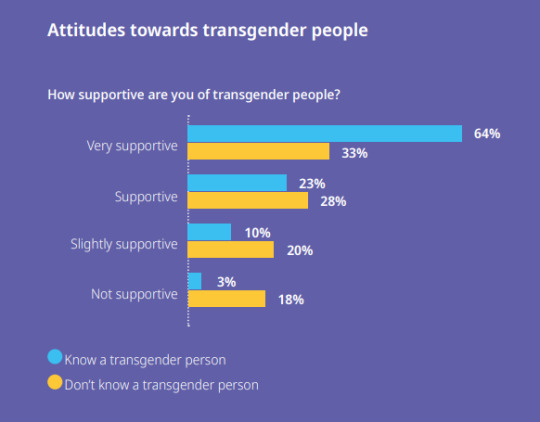
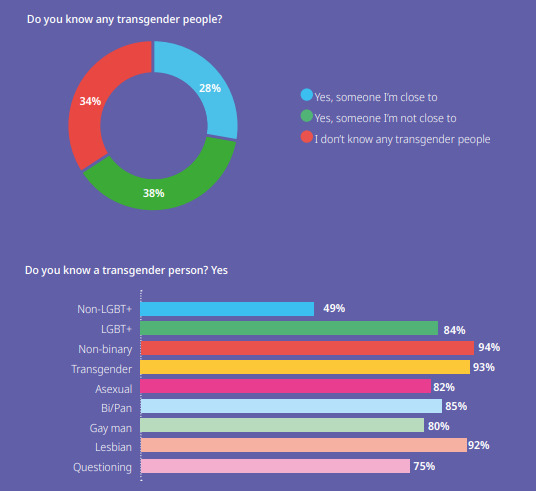
[ID: Headline reading "Attitudes towards transgender people. Question reading "How supportive are you of transgender people? Of people who "know a transgender person," 64% said "very supportive"; "supportive" 23%; "slightly supportive" 10%; "not supportive" 3%. Of those who "don't know a transgender person," 33% said "very supportive"; "supportive" 28%; "slightly supportive" 20%; "not supportive" 18%. Second question "Do you know any transgender people?" Result: 28% "Yes, someone I'm close to"; 38% "Yes, someone I'm not close to"; 34% "I don't know any transgender people." Further breakdown of the question "Do you know a transgender person?": 49% of "non-LGBT+" people said "yes"; 84% of LGBT+ people; 94% of non-binary people; 93% of transgender people; 82% of asexual people; 85% of bi/pan people; 80% of gay men; 92% of lesbians; 75% of questioning people. End ID]
The "do you know any transgender people" question is worded slightly differently each time—plus, the Just Like Us article and the report (p. 8) adduce the phrase "in real life" to "know a trans person," but this page doesn't—so I don't think we're getting the exact wording for that question that the survey respondents saw. The data for "how supportive are you of transgender people" isn't broken down according to whether the respondent said they were "close" or "not close" to the transgender person or people they knew; it also doesn't seem to be broken down into trans or nonbinary versus cisgender respondents.
"How supportive are you of transgender people?" was the only question dealing with this issue, and the responses "very supportive," "supportive," "slightly supportive," and "not supportive" were the only options available; there's nothing breaking down what "support" means in terms of policy (e.g. support versus non-support for consent-based clinics, national funding for transition care, non-discrimination laws, bathroom laws, &c. &c.). There is also no distinction made between "support" for trans women and trans men.
The claim "UK adults between the ages of 18 and 25 who answer 'not supportive' to the question 'How supportive are you of transgender people?' are several times more likely to also answer 'no' to the question 'do you know a transgender person' (or maybe 'do you know a transgender person in real life')" is supported, in my opinion. The sample size is large enough for that 3% to not be random noise.
The analysis in the Just Like Us article groups together "very supportive" and "supportive" when providing percentages of respondents of given identities who support trans people:
Of all LGBT+ identities, other than trans and non-binary people themselves, lesbian young adults were most likely to say they know a trans person (92%), and most likely to say they are “supportive” or “very supportive” of trans people (96%). In comparison, 89% of LGBT+ people overall said they were “supportive” or “very supportive” of trans people, and just 69% of non-LGBT+ people said the same.
There is no full breakdown of how many people are "very supportive," "supportive," "slightly supportive" or "not supportive" of trans people by identity label. The relevant data is on p. 63 of the report:
"Looking at who was the most supportive of transgender people:
non-binary respondents were 97% supportive or very supportive with 1% of respondents indicating they were not supportive;
lesbian respondents were 95% supportive or very supportive [everywhere else in the report and in the reporting says 96%, so perhaps this is a typo] (3% were not supportive);
bi/pansexual respondents were 92% supportive or very supportive (2% were not supportive).
Of respondents who were gay men, 82% were supportive or very supportive of transgender people, with 7% indicating they were not supportive.
Among non-LGBT+ respondents 69% were supportive of transgender people, with 12% indicating they were not supportive."
It's not clear to me how they dealt with e.g. lesbians who were also transgender. Pages 69-70 of the report go into the questions that people were asked to identify their identity label for the purposes of statistical analysis ("Is your gender identity the same as the one you were originally assigned at birth?"; and "What is your sexual orientation?"). The fact that these are separate questions (as they should be) tells me that there's overlap between groups throughout the study; any data that says e.g. "83% of lesbian respondents" is combining cis and trans lesbians, and any result that says "67% of trans people" is combining heterosexual and LGB trans people.
So, while narrowing the respondents down to just cisgender LGB people to compare their support for trans people would have been one way to analyse the data, I'm guessing they didn't do that (plus, there's the article's wording of "LGBT+ people overall"; it wouldn't make statistics-analytical sense to compare cis lesbians with all LGBT+ people, plus it would presumably make the higher support % of lesbians less stark, which seems like the opposite of what Ashenden wanted to do).
When the article says "other than trans and non-binary people themselves," they don't mean that they excluded trans and non-binary people from the percentages given; they mean "other than the number you get if you measure support for transgender people just from trans and non-binary people." We're not given the number that would result from doing this. The number we're given in the report for non-binary people is 97% supportive (this number is not included in the article); we are not given a number for just trans people, but we can probably assume it also approaches 100%.
This means that the 96% support presumably measures support from cis and trans lesbians; the 82% of "supportive" and "very supportive" gay men includes cis and trans men; &c.
There is a major statistics-analytical problem with acknowledging that trans and non-binary respondents have the highest rates of support for trans people, but then not controlling the results of this question for whether the respondent was cis or trans. If a higher percentage of lesbian respondents were trans than the percentage of gay men respondents that were trans, this would itself skew the numbers for lesbian support higher. There's no reason to suppose that this did happen, but there is not enough information given about the data that Just Like Us collected to rule it out. Again, at no point are we given information about overlap between LGB and trans groups or a breakdown of what that overlap looked like (how many trans respondents were heterosexual versus LGB, &c.).
As I mentioned above, some of the survey focused on whether respondents "felt supported" at home and at school. Some snippets on the results of these questions can be found on pages 45-49 of the report. "[M]ore than 1 in 4" LGBT+ respondents "felt unsupported" in school compared to "1 in 10" non-LGBT+ respondents; 37% of transgender respondents and 39% of nonbinary respondents said they felt unsupported in school. Despite the survey's focus on the outcomes of felt support, and despite all respondents being asked if they were "supportive" of transgender people, no question asked transgender respondents if they "felt supported" by cisgender LGB people.
Generalisability of claims:
The sampling of the data (which is drawn entirely from people in the UK aged 18-25, mostly students) also means that the claims are not generalisable to the entire UK population; you can't say the "majority of anti-trans adults don’t know a trans person in real life" (the headline of the Just Like Us article) or "Most anti-trans adults don’t actually know a trans person in real life" (the headline of the Pink News article), since the survey did not take a representative sample of all adults. You can't say "lesbians are not anti-trans" (the url of the Gay Times article), since the survey is not representative of all lesbians.
Funding sources:
The report was sponsored by Deloitte Touche Tohmatsu Limited, a firm offering professional services (accounting, auditing, consulting, financial advisory, litigation consulting, and other services offered to businesses).
Cibyl, an independent research firm in the UK, "led on research design and delivery, then worked in partnership with Just Like Us to produce the report." They include the report ("Positive Futures") as an example of their work on their website. Their summary of the study focuses on the claim that "support in LGBT+ young adults’ teenage years" is necessary to the future development of their careers, and on what "employers and careers professionals can do to help LGBT+ young people feel safe and supported." This is the same kind of thing that Deloitte talks about when it comes to LGBT+ issues (namely, inclusion versus exclusion and support versus non-support in the workplace).
A video that Asheden produced with Mags Scott (partner at Deloitte) also focuses on how "support" for LGBT+ people "at home, in school, and in the workplace" leads to confidence in "career prospects" and ability to be onself "at work," and is necessary for LGBT+ people's mental wellbeing.
Just Like Us has an interest in promoting research that suggests that support for LGBT+ people in school will benefit them in their careers, since they sell training resources on forming LGBT+ groups, and talks with LGBT+ speakers, to schools. Just Like Us is a non-profit organisation.
Declaration of conflicts of interest and peer review:
This is an industry-sponsored study and not an academic one. There is no declaration of conflicts of interest required, and the study was not peer-reviewed.
Tl;dr:
Some breakdown of data was revealed in the report. The exact questions that respondents saw were not given. The data is not given with enough granularity to allow for anyone else to conduct statistical analysis based on it.
There is not enough evidence to say whether the study supports the claim that (cis?) lesbians are more supportive of trans people than any other identity group, since the survey was not clear what "support" means (someone may claim to support trans people as individuals while not supporting transition care, for example, due to some kind of "love the sinner, hate the sin" logic).
There is also a statistical problem with the support for this claim, since overlap between "transgender" and "cisgender" respondents is not controlled for. There is not enough data given in the report to allow anyone else to control for this factor. The results would hold if we assumed that similar percentages of e.g. lesbian, bisexual, and gay male respondents were transgender.
The results apply only to people in the UK aged 18-25 and cannot be generalised to all adults in the UK.
Summaries of this report given by the firms that funded and conducted it centre on the idea that "support" of LGBT+ people at home, at school, and in the workplace is necessary to allow them to thrive in the workplace. Just Like Us, who put out the report, sell LGBT+ talks and training to schools.
523 notes
·
View notes
Note
Venting but like. I know it's influenced by which circles I follow and such (I'm on this site, for example) but it feels like people just seem to associate gender varience with lesbianism. Like I see so little content of people who center femme gay men, or masculine women who aren't lesbians, etc. People constantly make jokes about like "sees what looks like two gay men but is actually two butches which is ontologically better" but never never anything like what if these two femme looking individuals were gay men. That and like the lack of community and language for feminine men just makes it harder for me to feel like I fit in where the options seem like cis gay overall gender conforming men on one side, people attracted to women of diverse genders and presentations and experiences on the other. People talk about events where they've felt seen as their gender and found other people with queer gender experiences and it's like yeah it was at the Dyke bar or something and I love that for them but where do I go someone who's gender is femme but also man and attracted to men cause the gay male community feels so distant and very cis and conforming, I don't feel a sense of belonging there but the alternative feels desperate to tie me back into womanhood or attraction to women. Butches and dyke's are fantastic but I wish I could find more queer rep of gender exploration that isn't tied to lesbians, personally. And I know it's largely because of the history of these groups and all that and the ways that lesbianism is treated and policed (how there's always arguments against bi lesbians but not bi gay men, trans man lesbians but people just flat out ignore trans women gay men(see the language deficit) etc. There's no equivalent to the butch community for gay men as far as I know, not to the same extent. There's not even commonly used terminology similar to butch or lesbian that gets across that kind of meaning without explicitly tieing in a binary gender(people try with things like Achillean, but that doesn't have the same recognition and often gets mocked instead)(easier to say "the term lesbian includes nonbinary people" than it is to say "the term gay man includes nonbinary people") so I've had to say gay men community even if I'm not entirely a man because there's no words for me) but I feel like I don't even know where to look to find people like me a lot of the time.
This is all just a very personal rant and probably not entirely indicative of wider reality but it helps me to express it to someone else, so I greatly appreciate you having your ask box open to listen <3
It's not things I have a good handle on, but I've heard very similar from others. You're not alone, anon!
112 notes
·
View notes
Text
Non-lesbians love to act like being a lesbian is restrictive, but that couldn't be further from the truth. Lesbianism is freedom.
Lesbians are not all binary cis women; there are transfem lesbians, transmasc lesbians, nonbinary lesbians of all types, a lot of us even consider lesbian to itself be a gender. And that's only scratching the surface of how diverse lesbian gender expression can be, even within those categories there are yet even more types of lesbians, we play around with femininity and masculinity in so many ways!
Not to mention butch lesbians, femme lesbians, stud lesbians, and stemme lesbians; the latter two being black lesbian identities. Some lesbians are none of those things, and that's fine too! There are lesbians who use pronouns other than she/her; they/them lesbians, he/him lesbians, lesbians who use neopronouns...
Lesbians are not all TME; there are trans lesbians, nonbinary lesbians, intersex lesbians. The lesbian community is more inclusive of trans people than most, despite what others may think.
There are lesbians with many different relationships to their attraction; asexual lesbians, aromantic lesbians, lesbians with trauma around sex or romance, lesbians who don't want to be in relationships, lesbians who are sex workers, lesbians who experience comphet, lesbians who didn't always know they were lesbians and may have been in relationships with men before finding out...
Lesbians are not all white; there are black lesbians, asian lesbians, latine lesbians, native lesbians...
Lesbians are not all privileged outside of our LGBT identities; there are mentally ill lesbians, disabled lesbians, fat lesbians, autistic lesbians, lesbians with personality disorders, lesbians with eating disorders, lesbians with trauma, lesbians who struggle with addiction, lesbians with scars and bodies seen as atypical in the eyes of western beauty standards...
There are lesbians of all social classes and demographics; poor lesbians, working class lesbians, Jewish lesbians, Muslim lesbians, Hindu lesbians, Buddhist lesbians...
There are lesbians all throughout history who have fought and bled and died for who we are, lesbians who continue to fight today for who we are, lesbians who live completely isolated from any kind of support structures and aren't able to be themselves.
The thing that all of these different types of lesbians have in common? We aren't men, and aren't attracted to men; not cis men, not trans men, not nonbinary aligned men. We exclusively love other women and sapphic aligned nonbinaries.
Being a lesbian is not restrictive, and if it feels that way to you, you're simply not a lesbian. Don't try to change who we are, lesbianism is a beautiful and fulfilling identity just the way it is. 🧡🤍💖
733 notes
·
View notes
Text
i have been trying for like. months to explain how the relationship between butch lesbians and trans men is not something akin to polar opposites and this is all i got. like it's not like this:
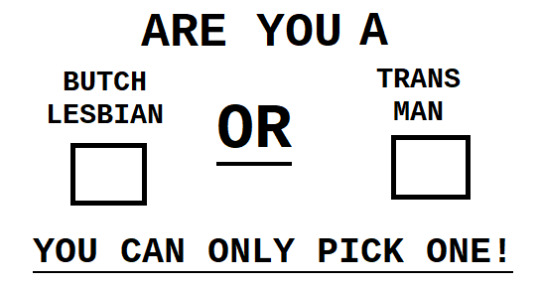
it's a venn diagram with a massive overlap in the middle. i'm not saying EVERY butch is a trans guy and EVERY trans guy is a butch dyke , i'm just saying it looks more like this:

these are not "mutually exclusive" terms- they do not mean the same thing, but we can be the same people, an very often are. there is a long history of butches who identify as FTM, trans men, drag kings, genderqueer, genderfluid, transmasculine, male, polygender, and two-spirit lesbians, and so much more. the relationship between lesbianism and queer masculinity is inseparable and the only people telling you that butches and trans men need to violently separate from one another and be at each other's throats are terfs. even if we do not share identities, we share our struggle together as heavily misunderstood and unseen masculine queers.
we stand up for each other when our identities get confused by strangers, and we get misgendered. we stand up for each other when terfs and terfpilled people tell us that transmasculine people and men can't be lesbians, when people say "butches just want to be men", when people say "butches aren't real women", when people call each of us bull dykes and trannies, when people mock the way FTMs walk and talk and look, and when people tell trans men they're "just butch dykes in denial". we stand up for each other and understand each others struggles.
whenever a butch lesbian asserts they're a woman no matter how masc they are, whenever a trans man asserts that they are a man and not a butch, whenever a butch struggles to be seen as both a man and a lesbian, and whenever a trans man returns to the lesbian community while embracing their manhood, we are part of the same community, we share the same struggles, and we owe it to each other to stay strong.
we are not enemies. we are bedfellows, lovers, family, spouses, partners, husbands, wives, brothers, sisters, siblings, friends, each others support networks, even if we don't share identities perfectly. whether you are butch and a woman, butch and a man, butch and something else entirely, a male, ftm, genderfluid, polygender, genderqueer, transmasculine, nonbinary, two-spirit or whatever else you may be lesbian, you are part of our family and your experience is worth being heard.
#butch#butch lesbian#lesbian#dyke#ftm#trans man#trans men#transsexual lesbian#trans butch#butch dyke#trans#transgender#lgbt#lgbtq#queer#transsexual#nonbinary lesbian#genderqueer lesbian#genderfluid lesbian#transmasc#transmasculine#transmasc lesbian#ftm lesbian#male lesbian#bigender lesbian#our writing
16K notes
·
View notes
Text
So ive had this saved in my drafts for a while now- but theres a point id like to make about butch/femme identity and expression and think this is ready despite the crap i might catch for it
On my days off and when i go out for fun, lots of times i look like this vvv
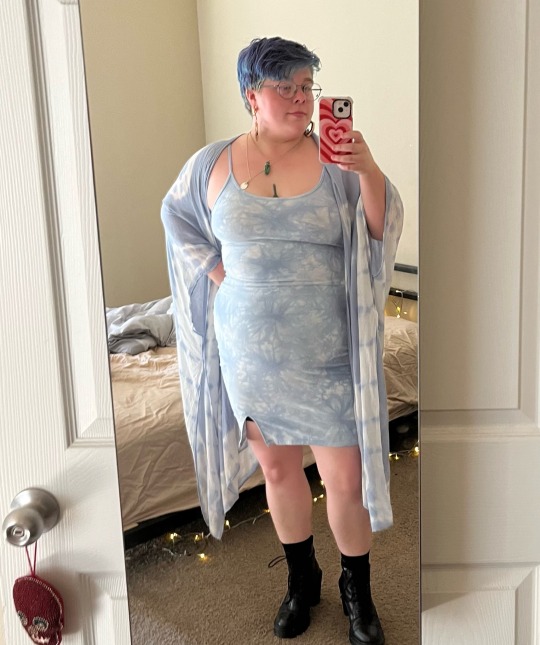
And other times, especially because im a blue collar dyke, i look like this vvv
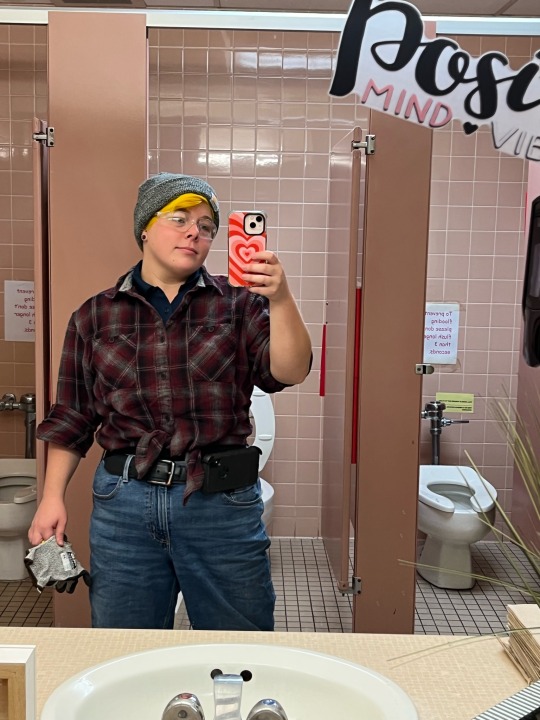
The thing that both these photos have in common is that, regardless of how i may appear, i am a femme lesbian. I am not magically butch at work just because i have to wear jeans and work boots for safety. On the clock I am often mistaken for a man and harassed for using the women’s bathroom, people call me sir and damn near keel over trying to correct themselves. I understand that people will look at me as masculine because im in a mans trade.
And yet im still a femme!
You know why? Because being femme is not about how i dress or how long my hair is or the job i work or the body im in, but who i am, how i love, and how i want to be loved back. Its my reclamation of my gender and sexuality and romantic life.
Theres this idea that femme lesbians are “the girl” lesbians and butches are “the boy” lesbians. Femmes are stereotyped as straight passing hyper feminine (and often times cis) girls. But if youve ever met a femme thats not always (in my experience- USUALLY) the case. We often are nonbinary (hi! Also me!) and/or gender nonconforming even in our femininity- taking the things that cishet society hates the most in women (ie body hair/body fat/masculine jobs/deep booming voices- etc) and owning those characteristics in ways that make us feel free and most like femmes 💕
I personally feel most comfortable being feminine off the clock and covering myself in glitter and being a tacky fat furry muppet because its how i feel best recognized by the butches i adore so much! But i get to reclaim womanhood or whatever adjacent, gender-fucked, lesbiany, thing ive got going on, and that doesn’t change when i wear jeans and work boots.
Femmes get to be whatever the hell we want- being broad shouldered and deep voiced and fat and furry and in a trade are not traits that magically make me incapable of being femme- and im over this whole ordeal where y’all assign butches and femmes as either “the boy” or “the girl” of the relationship and expect us to be exclusively feminine or masculine and never cross or mix- just recreating useless gender roles that we have zero reason to uphold.
(And this goes the absolute same for butches/studs who express feminine traits and DOUBLE for trans butches/studs/femmes)
#butch/femme#femme lesbian#gnc femme#gnc femme lesbian#butch#femme#nb lesbian#lesbian#dyke#femme4butch#butch4femme#this whole post has been brought to you by-#the fact that me existing in my body makes people scratch their heads and assign me labels based off their perception#im t i r e d
3K notes
·
View notes